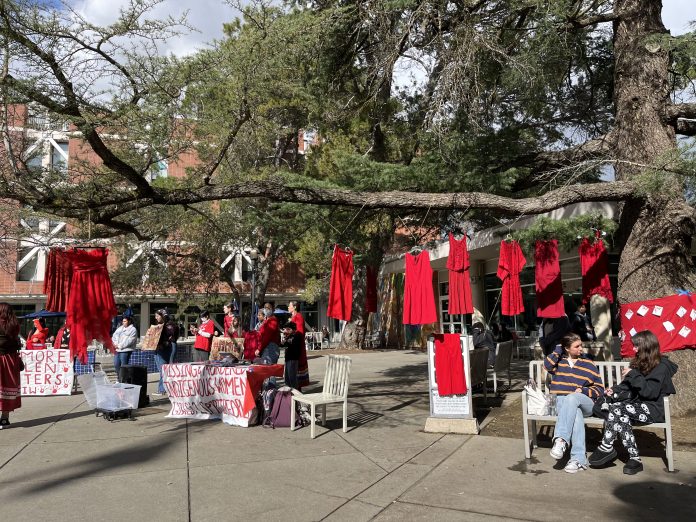The event saw several stories about missing and murdered Indigenous women, as well as performances by Indigenous drummers
By RAGAVI GOYAL — campus@theaggie.org
Students of the class Native Americans in Contemporary World (NAS 115) held a flash mob in the Memorial Union quad at 1:30 p.m. on Wednesday, Feb. 21 as a part of their Missing and Murdered Indigenous Women (MMIW) project.
The event started with the quad surrounded by red dresses as a symbol of each Indigenous woman who was murdered. The brief introduction of the project was followed with a song performed by Indigenous drummers who were invited to the event.
This event was led by a student in the class, who asked to remain anonymous, sharing stories of Indigenous women who were abducted, went missing or were murdered.
“I’m going to take a minute to talk about a story that is about a post-Bringham Mine’s sister,” the student read to the crowd. “Her name is Jessica Alba. Jessica Alba was murdered on April 20. Jessica Alba was murdered by her boyfriend — the father of her children.”
The quad echoed Jessica Alba’s name as everyone commemorated her. The stories about these women were similar in that they weren’t usually followed up by proper investigation.
“Far too often, murderers and missing person[s] cases in Indian counties go unsolved and unaddressed, leaving families and communities devastated, seeking answers [and] looking for justice for their families,” the speaker said.
There were also dresses of children hung up, symbolizing the Indigenous children that were harmed or went missing.
“We want no more stolen sisters,” the speaker said. “We want no more stolen family members. We need justice for our people. We need justice for our family members.”
There was a red tapestry wrapped around a tree — on it, the names of victims. Everyone chanted these names in due respect, from names of little girls who are still missing to names of older women who were murdered.
“We know that this is an issue that’s in Indian country here and in North America, but this is also an issue for women all over the world,” the speaker said.
Another speaker from the class began to talk about femicide and its prevalence affecting women, girls and two-spirit people. Femicide is a term that refers to the murder of a woman, perpetuated by a man due to her identity as a woman or for presenting as a woman. This definition includes other forms of violence against women, such as kidnapping and domestic, sexual and psychological violence.
Despite femicide being a crime, according to the speaker, a majority of cases are charged as assault and battery which leads to shorter sentences. Some have even resulted in acquittals being weaponized and used to justify and normalize violence against Indigenous women.
“Within my community, machismo is very prevalent,” the speaker said. “It’s very sad to say, but there are many reasons for it — due to capitalism, due to colonialism [and] due to the patriarchy. What ends up happening is that women are disrespected, they are beaten, they are murdered and nobody cares. Nobody is forced to care.”
MMIW is a hemispheric issue that has seen too many lives lost and is a protest against the violence for colonization, capitalism and war.
“They were mothers, sisters, daughters and we cannot forget them,” the speaker said. “As Indigenous women, we feel that it is important to acknowledge and speak out against the genocide being committed against Palestinian women and children.”
This flash mob continued with a song from the drummers, followed by another disheartening story.
“Nicole Smith was a member of the Mendocino Coast Manchester Band of the Pummo People,” the first speaker read. “On the evening of Nov. 18, 2017, 33-year-old Nicole Smith spent the evening with family. Early the following morning, around 5:33 a.m., shots rang out from outside, piercing the walls of the home. A bullet struck Smith, and she would succumb to the gunshot wound at the scene. A person of interest was identified in her death, Raymond Soto, but he would later be released from the Mendocino County Jail due to lack of evidence. This is just one of the many, many stories that have been unsolved.”
The event ended with another demonstration by the Indigenous drummers and a march to the Cross Cultural Center where the display would be placed.
This project was undertaken by the entire class under the guidance of their professor, Juan Avila Fernandez, who graduated from the UC Davis graduate school in 2017 with his Ph.D in history with a Native American studies emphasis.
“I am a Yoeme Native American,” Fernandez said. “This is one of the most contemporary issues that’s important to the Native American community.”
Fernandez says that the Native American studies department was founded 53 years ago, and one of the founders was David Risling Jr., a Native American and activist professor.
“Unfortunately, his granny [is missing],” Fernandez said. “His granny is Emily Riesling from the Hoopa Reservation, and she’s been one of the victims of this epidemic.”
Part of the reason Fernandez thinks that it is important to hold demonstrations like these is because of cases like Emily Risling.
“They designated it a cold case, even though it’s only [been] about three years that she’s been missing,” Fernandez said. “She still hasn’t been found, and the investigation doesn’t seem to be going very far. That’s the other reason that I’m doing it — to try to get some justice for her.”
Written by: Ragavi Goyal — campus@theaggie.org




